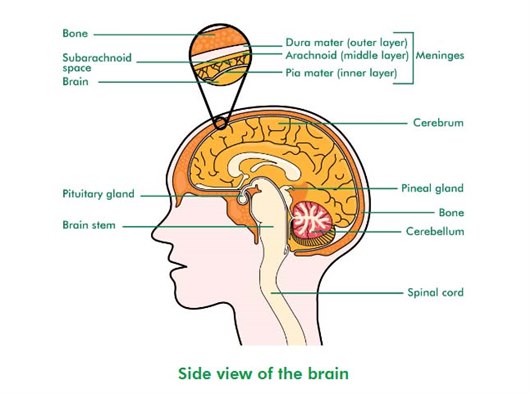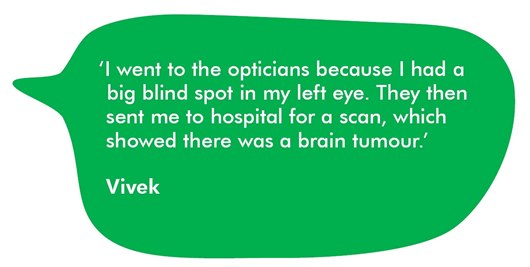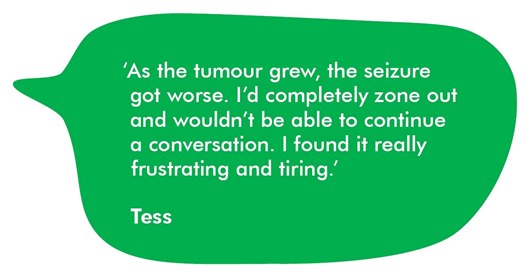This blog, written by our intern Helen, explains what a brain tumour is and what the symptoms of a brain tumour can be. If you are worried about any of the symptoms listed here, it’s important that you see your GP.
This week is the 11th International Brain Tumour Awareness Week. Many of you will also be glued to your screens for the finale of the 8th series of ‘The Great British Bake Off, but you may not know that Sue Perkins, the former presenter of Bake Off, has a benign brain tumour in her pituitary gland.
Both Sue and the International Brain Tumour Awareness week aim to raise awareness of brain tumours, as well as the common signs and symptoms. In 2015, Sue Perkins revealed that her father had also been diagnosed, and later died from, a tumour. This was the turning point that made her realise she needed to get her symptoms checked.
“It has been a very challenging time and I think the best thing I can do to honour him is to get myself sorted, to at least make myself right.” she said, speaking to Kirsty Young on the BBC radio programme, Desert Island Discs.
What is a brain tumour?
A tumour is a growth of abnormal cells. A tumour that starts in the brain is called a primary brain tumour. This can either be benign (not cancer) or malignant (cancerous).
There are lots of different types of brain tumour, and you can find list of the main ones here. Brain tumours can occur in various areas of the brain.
The cerebrum is the largest part of the brain, made up of two hemispheres. But there are several other areas where it is possible for a tumour to develop, including the cerebellum, the brain stem, the cranial nerves, the pituitary gland and the pineal gland.
You can find out more about the symptoms of brain tumours here, including a table to help explain how the position of a brain tumour can determine the symptoms.

What are the symptoms of a brain tumour?
The symptoms of a brain tumour can vary depending on where the tumour is in the brain and the speed at which it grows.
Some symptoms may develop suddenly, and some may start over a period of months or even years. Different areas of the brain have different functions, so symptoms may depend on the position of the tumour. Here are some examples of symptoms (more detailed information is available here or in our booklet Understanding primary brain tumours.)
It is completely normal to get headaches from time to time because of stress or tension. Headaches do not necessarily mean you have a brain tumour.
However, you should see your GP if:
• your headaches are getting worse over time
• your headaches are different from what they are normally like
• your headaches wake you up at night, or are worse in the morning
• your headaches make you feel sick
• you notice a change in your eyesight.

Seizures are a common symptom of brain tumours. Some seizures may make you go blank and stop responding to people around you for seconds or minutes. Other types may make your muscles relax and tighten so your body stiffens and jerks or twitches and you fall down.

A tumour can cause changes in personality and behaviour, which are usually noticed first by friends or family members. Some people have problems with their thinking, reasoning or memory.
In this video, brain tumour and central nervous system clinical nurse specialist Fiona explains more about brain tumours and the symptoms to look out for.
Where can I get more information and support?
You can read more about primary brain tumours and the symptoms in our booklet Understanding primary brain tumours. We also have information about brain tumours on our website.
You can call our cancer support specialists on 0808 808 00 00, or you could visit our Online Community to talk to other people affected by cancer and get support.
To see what else Macmillan's cancer information team has been blogging about, please visit our blog home page! You can subscribe to receive our blogs by email or RSS too.
We're with you every step of the way
The Macmillan team is here to help. Our cancer support specialists can answer your questions, offer support, or simply listen if you need a chat. Call us free on 0808 808 00 00.
Comments? Feel free to add them below (you need to be logged in).
Keep in touch Follow Macmillan’s cancer information team on Twitter @mac_cancerinfo
Whatever cancer throws your way, we’re right there with you.
We’re here to provide physical, financial and emotional support.
© Macmillan Cancer Support 2025 © Macmillan Cancer Support, registered charity in England and Wales (261017), Scotland (SC039907) and the Isle of Man (604). Also operating in Northern Ireland. A company limited by guarantee, registered in England and Wales company number 2400969. Isle of Man company number 4694F. Registered office: 3rd Floor, Bronze Building, The Forge, 105 Sumner Street, London, SE1 9HZ. VAT no: 668265007